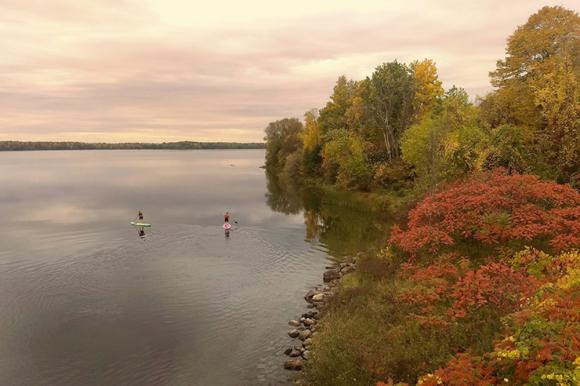How climate change threatens healthy pregnanciesYour weekly newsletter about faith and climate change June 7, 2024  Many words have been shared claiming climate change is a pro-life issue. It's a stance that is supported by Catholic social teaching, and the argument usually contains general statements about how we're called to care for God's creation, most especially the poor and the vulnerable — who are at greater risk of climate change-induced suffering and death. In short, climate change threatens lives, and therefore it is a pro-life issue. What I think is less often discussed (perhaps because there hasn't always been data on it) is the very specific and direct ways in which climate change affects what many people consider the primary pro-life issue — the successful conception, pregnancy and birth of healthy babies by healthy mothers. A new series, produced through a newsroom collaboration between Grist, Vox and The 19th, explores how several facets of climate change are affecting reproductive lives around the world. While the four stories in the series focus on sea level rise and fresh water salination, vector borne diseases like malaria, extreme heat, and rapidly intensifying storms in specific areas, they also show how the population affected by such climate impacts is expected to grow. We've republished the series "Expecting worse: Giving birth on a planet in crisis" with permission on EarthBeat this week because even though these stories do not contain explicit religious perspectives, they expertly report on the intersection of two life issues that are important to people of faith. Read the full series: Salt in the womb: How rising seas erode reproductive health Pregnant in a warming climate: A lethal 'double risk' for malaria Four lost pregnancies. Five weeks of IVF injections. One storm. 'How did we miss this for so long?': The link between extreme heat and preterm birth
What else is new on EarthBeat: by Justin McLellan, Catholic News Service The emphasis on listening, dialogue and discernment central to the Synod of Bishops on synodality originated from the periphery of the universal Catholic Church — in the Amazon — and its fruits are now challenging the church worldwide to adopt a spirit of communal participation and decision-making in the church, said the cardinal in charge of the synod.
 by Joachim Pham Religions can make contributions to environmental care by inspiring their members to recognize their common responsibility for the Earth and take action to conserve and maintain natural resources for future generations, said one speaker.
 by Fredrick Nzwili, OSV News A Kenyan bishop urged young Catholics to act together to care for the environment and protect it, as he led the Catholic Youth Network for Environmental Sustainability in Africa in marking its 10th birthday.
 by Kimberley Heatherington, OSV News The largest wildlife crossing in the world — the Wallis Annenberg Wildlife Crossing — has just begun construction in Agoura Hills, California, some 30 miles west of Los Angeles.
 by Audrey McAvoy, Associated Press The Maui County Council voted 9-0 to pass a resolution opposing the project. The measure said Haleakala's summit was a sacred place used for religious ceremony, prayer and connecting to ancestors.
 by Justin McLellan, Catholic News Service For Catholic social teaching to become a "compass" for financial structures and policy, he said, "it is necessary not to stop at exhortations but to be able to look at the workings of finance, to expose its weaknesses and imagine concrete corrections."
 by Christina Leaño The first step in contemplation is to pause. By pausing, we make space to connect with God in the moment.
What's happening in other climate news:Can Mexico's Sheinbaum, a climate scientist, shake Lopez Obrador's oil legacy? —Cassandra Garrison for Reuters Vermont becomes 1st state to enact law requiring oil companies pay for damage from climate change —Lisa Rathke for The Associated Press Pennsylvania's Fracking Wastewater Contains a 'Shocking' Amount of the Critical Clean Energy Mineral Lithium —Kiley Bense for Inside Climate News NYC had a plan to make it hard for cars to enter the city. Here's why the governor blocked it. —Nicolás Rivero and Oliver Staley for the Washington Post Seattle University, one of top 10 most sustainable US colleges and universities —EcoJesuit
|
In this blog, we'll look at how men and women at serving Jesus Christ both at home and abroad. We'll focus on how God is using their work to transform the lives of people all over the world.
Friday, June 7, 2024
EarthBeat Weekly: How climate change threatens healthy pregnancies
Subscribe to:
Post Comments (Atom)
SojoAction Alert - Demand Peace, No War With Iran!
View this email in your browser As Christians we must demand peace Once again President Trump has launched air strikes on Iran in an act of ...

-
Genocide, Worker Rights, and White Christian Nationalism NCC Newsletter July 2, 2021 Click here to donate Recent Interview with Jim Winkl...
-
On the 80th anniversary of the atomic bombings in Hiroshima and Nagasaki, churches and communities across the world deepened their calls for...
-
Dear Siblings in Christ Jesus and Fellow Disciples of our Crucified and Risen Lord, Scripture reminds us that as Christ Jesus journeyed to t...


 Stephanie Clary
Stephanie Clary

No comments:
Post a Comment